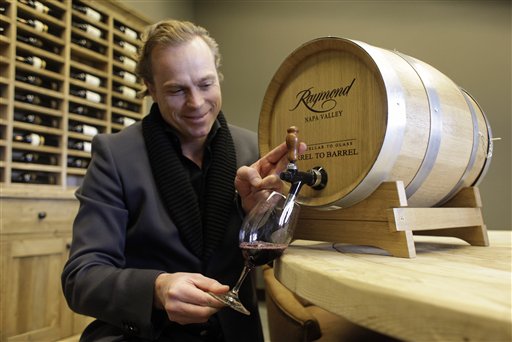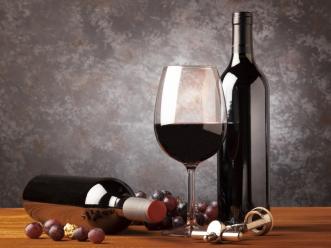 Founded in 1980, Boisset Family Estates is a family-owned producer and importer of fine wines with its roots in Burgundy, France. Boisset’s collection of more than twenty historical and unique wineries boast leading positions in the world’s pre-eminent terroirs, including Burgundy, Beaujolais, the Rhône Valley, the South of France, Canada, and California’s Russian River Valley and Napa Valley. Jean-Charles Boisset, President of Boisset Family Estates, has implemented sustainable, organic, and biodynamic farming practices at the family’s vineyards, while simultaneously introducing alternative packaging innovations that reduce a wine’s environmental impact and carbon footprint.
Founded in 1980, Boisset Family Estates is a family-owned producer and importer of fine wines with its roots in Burgundy, France. Boisset’s collection of more than twenty historical and unique wineries boast leading positions in the world’s pre-eminent terroirs, including Burgundy, Beaujolais, the Rhône Valley, the South of France, Canada, and California’s Russian River Valley and Napa Valley. Jean-Charles Boisset, President of Boisset Family Estates, has implemented sustainable, organic, and biodynamic farming practices at the family’s vineyards, while simultaneously introducing alternative packaging innovations that reduce a wine’s environmental impact and carbon footprint.
You have your hand on the pulse of global wine. What wine varieties would you like to see the public embrace more fully?
Consistent to my homeland of Burgundy, we are hoping that Pinot Noir can be further embraced worldwide for its sensitive, emotional, elegant and refined sensibilities, and that it can continually entice consumers, chefs and the world as the most alluring variety and the best to pair with the world’s diverse cuisine.
Much has been written and debated concerning the 100 point rating scale. Some say it has empowered consumers, others claim it has distorted wine prices, still others believe it has changed the quality of wines being produced. What do you see as being the long term impact of the 100 point rating system?
Our view is that having the point systems, or star systems or whatever it is, if it helps guide consumers, if it helps to further their exploration of the world of wine, then we are fine with whatever system they find most useful for them to open the doors to enjoying and discovering wines. We believe it is helpful to rely on experts to guide consumers – again, whether its through points, or stars, or any system we can imagine – it is important to have people constantly educated and supported to enjoy wine more.
We are a very terroir-oriented company and we believe in making wine at the source and believe wines should reflect their place rather than any critic’s palate, and we will continue to make our wine according to this philosophy. Globally though, it is critical to have further help to communicate on the quality of wine and journalists and the world of wine critics are essential and important to legitimize wines, communicate, educate and build the world of wine, whatever the scale. Journalists help us to progress, to focus continually on the quality of the wine, and they help to bring our wines to the world with a great education and purpose.
Rising wine alcohol levels in U.S. and foreign wines are an important topic of current discussions. What are your thoughts on the subject?
I believe that we cannot go against nature, if nature gives us high alcohol it does not mean that we should suggest that we can go against that. It’s essential to not only look at alcohol to guide our assessment of wine, but the overall balance. As a family from Burgundy we tend to enjoy cool climate wine making and believe that wine should complement food and a meal. We also believe that wines are meant to be kept over time, and therefore balance is critical and preferred. Our wine should showcase their region and their terroir, and we cannot necessarily go against nature when making fine wines.
You have helped champion alternative packaging for wine, including Tetra Paks, PET and even aluminum. Do you foresee a time when the traditional glass wine bottle is dethroned as the packaging of choice for wine?
Glass is an important choice for wines meant to age and people have long held great esteem for the romance and aesthetic of the bottle. We love and appreciate it. But there are also many wonderful opportunities for other methods and modes of packaging, and we have embraced alternative packaging where it helps to improve value, ecology and convenience. Alternative packaging such as Tetra Pak, PET, or aluminum bottles reduce the carbon footprint of wine packaging while improving convenience and opening new opportunities for consumption by enabling consumers to enjoy wine while on a picnic or in any location where glass may not be convenient. It is important to us not to replace glass, but to reduce our impact on the environment while making wine more accessible in many unique consumption moments.
You have been described as a power broker and innovator in the wine world, and you run a kind of wine empire. As it relates to your expanding portfolio, is bigger necessarily better? Or is the leverage you possess important to your acquisitions?
We have built a family collection of wineries that each boast unique places in the world of wine. Each holds a special place for its history, its pioneering reputation in its specific terroir, and how it complements our portfolio. We have never pursued size for the sake of size; rather, we have sought to develop a meaningful collection of wineries that boast unique stories. Our global footprint, in both the “old” world and “new” uniquely enables us to bring wines to the world stage – to increase their global presence. For example, we are enamored today to be able to tell the story of the history of California through the eyes of Buena Vista Winery, California’s first premium winery, on a world stage, and are delighted that our international presence opens opportunities to showcase the wines and history of California to the world.
Deloach, Raymond, and Buena Vista are just some of the notable California wineries under the Boisset Family Wines umbrella. Was there ever any concern about acquiring these well-known labels for fear of loyal consumers abandoning those wines after an “outside” source purchased them?
We respect and embrace the deep history of each of the wineries in our collection and have sought always to bolster and strengthen their reputation and value, for both existing consumers with a long love and passion for the wineries, and to provide new consumers an opportunity to discover them. We strive to build on their history and reputation and to go much further – to embrace the past to strengthen their future. We are a family deeply imbued in the wine world – wine is truly in our blood – and by communicating our family values and passion for the wine world we hope always to show to loyal consumers our commitment to improving those wineries – from wine quality to the experience they’ll have at the winery, we believe we prove our commitment to the wineries by acknowledging their greatness and taking them to a new level. Consumers appreciate and respect Boisset’s commitment to making their favorite wineries even better than before.
Your family started in the wine business in 1961 and you grew up Côte de Nuits, pretty much immersed in the wine industry. Had you ever considered a career outside of wine, and if so, what might that have been?
Wine has always been part of my DNA and my fabric as an individual. It is such a product of civilization and culture that I could not have imagined doing anything else. Wine is the epicenter of every artistic and creative form. It is enchanting, challenging and an artistic expression of the highest form. I have had a fascination for wine from a very early age and could not have imagined doing anything else.
You are a keen marketer of your wine portfolio. How crucial is it in today’s crowded wine industry for wineries to comprehensively understand and implement an aggressive wine marketing strategy? What is the one thing most wineries fail to accomplish when they market their wines?
Passion. And consistent luxury positioning without compromise. Wine is a product of nature and luxury and should be valued, treasured and promoted with passion and commitment.
The majority of your wines are from France and California, but you have partnerships in Canada and Italy as well. What other wine regions, whether in the U.S. or globally, have you considered for potential venues for new wine acquisitions for Boisset?
We have been very true and consistent to our own personal orientation as Franco-Americans, which is our strength and our passion, and therefore we are only in France and the U.S. We want to continue to pursue our appellation strategy in the U.S. and to further study the many wonderful and diverse AVAs that are continually being refined and strengthened. The U.S. will be an important source of our passion, growth and excitement in the future as it continues to evolve and refine its wine identity. We have very much committed ourselves to focus on the Franco-American strategy as it aligns with our philosophy, vision and friendship.
What is the best part of your job?
Everything!





